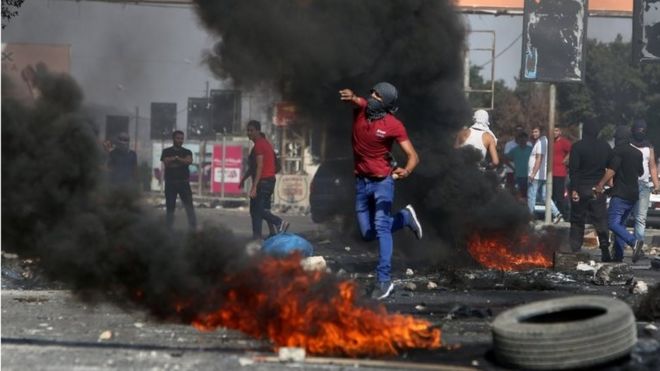 AFP
AFP
Fresh violence has erupted between Israel and Palestinians in the West Bank and Gaza, with three Palestinians killed in clashes, Palestinians say.
Two were killed in confrontations with Israeli troops over the Gaza border, medical sources said.
Also, in the West Bank, a Palestinian posing as a journalist stabbed and injured a soldier and was shot dead.
Violence between the two sides has spiralled, with near-daily stabbings by Palestinians of Israelis this month.
Seven Israelis have been killed and dozens wounded in the stabbings and some gun attacks. At least 37 Palestinians, including several of the attackers, have been killed in the growing unrest.
The upsurge began last month when tensions at a flashpoint holy site in East Jerusalem revered by Jews and Muslims boiled over amid rumours Israel planned to relax long-standing rules to strengthen Jewish rights at the complex. Israel has repeatedly denied such claims.
The UN Security Council held an emergency meeting on Friday on the upsurge of violence.
'Reckless statements'
Opening the meeting, UN Assistant Secretary-General Taye-Brook Zerihoun welcomed repeated assurances by Israeli Prime Minister Benjamin Netanyahu that the status quo at the flashpoint holy compound, known to Jews as Temple Mount and Muslims as Haram al-Sharif, would not change.
But he said that "reckless statements made by Palestinian and Israeli extremist elements reinforced by some mainstream voices as well" had created a different impression.
A second factor behind the recent escalation in violence was the "heavy handed approach by the Israeli security services", he said.
The Israeli deputy ambassador to the UN, David Roet, defended Israel's approach, saying it faced an enemy "willing to die in order to kill" and was "responding proportionately".
Violent protests spread across parts of the West Bank on Friday, with clashes reported in Bethlehem, Ramallah, Tulkarm and Nablus, where a Palestinian was killed, Palestinian medical sources said.
Pictures from Bethlehem showed masked Palestinians throwing sling-shots at troops from behind industrial bins, as soldiers fired tear gas to disperse them.
Similar scenes played out in other parts of the occupied territories.
In Gaza, protesters, some throwing stones, advanced towards the border fence with Israel when troops opened fire, reports say.
The health ministry in Gaza said two Palestinians were killed in separate incidents, and dozens of other people injured.
It came on what Hamas, the Islamist group dominant in Gaza, had earlier declared a "day of rage" against Israel.
Tomb torched
Earlier, Palestinian rioters torched a Jewish holy site in the West Bank city of Nablus, amid soaring tensions.
Dozens of Palestinians overran Joseph's Tomb, revered as the resting of the biblical figure, and where Jews go to pray.
Palestinian police dispersed the crowd and firefighters extinguished the blaze before Israeli security forces arrived.
Palestinian leader Mahmoud Abbas condemned the attack on the tomb as "illegal", adding that it "offends our culture and our religion and our values".
Elsewhere in the occupied West Bank, a Palestinian disguised as a news photographer stabbed and moderately wounded an Israeli soldier, the Israeli military said.
It said the attacker was shot dead in the incident in the Jewish settlement of Kiryat Arba, next to Hebron.
US President Barack Obama said he was "very concerned about the outbreak of violence" and urged leaders on both sides to "try to tamp down rhetoric that may feed violence or anger or misunderstanding".
US Secretary of State John Kerry spoke to both Mr Abbas and Mr Netanyahu on the phone to "offer his support for efforts to restore calm".
Mr Kerry also discussed plans to meet Mr Netanyahu "in the near future". Reports suggest the meeting is likely to take place in Germany next week.
What is happening between Israelis and Palestinians?
There has been a spate of stabbings of Israelis - several of them fatal - by Palestinians since early October, and one apparent revenge stabbing by an Israeli. The attackers have struck in Jerusalem and central and northern Israel, and in the occupied West Bank. Israel has tightened security and its security forces have clashed with rioting Palestinians, leading to deaths on the Palestinian side. The violence has also spread to the border with Gaza.
What's behind the latest unrest?
After a period of relative quiet, violence between the two communities has spiralled since clashes erupted at a flashpoint Jerusalem holy site in mid-September. It was fuelled by rumours among Palestinians that Israel was attempting to alter a long-standing religious arrangement governing the site. Israel repeatedly dismissed the rumours as incitement. Soon afterwards, two Israelis were shot dead by Palestinians in the West Bank and the stabbing attacks began. Both Israel and the Palestinian authorities have accused one another of doing nothing to protect each other's communities.
Is this a new Palestinian intifada, or uprising?
There have been two organised uprisings by Palestinians against Israeli occupation, in the 1980s and early 2000s. With peace talks moribund, some observers have questioned whether we are now seeing a third. The stabbing attacks seem to be opportunistic and although they have been praised by militant groups, Palestinian leader Mahmoud Abbas has said Palestinians are not interested in a further escalation.
 Stay Updated And Connected With sofogist.Com Daily..
Stay Updated And Connected With sofogist.Com Daily.. 





